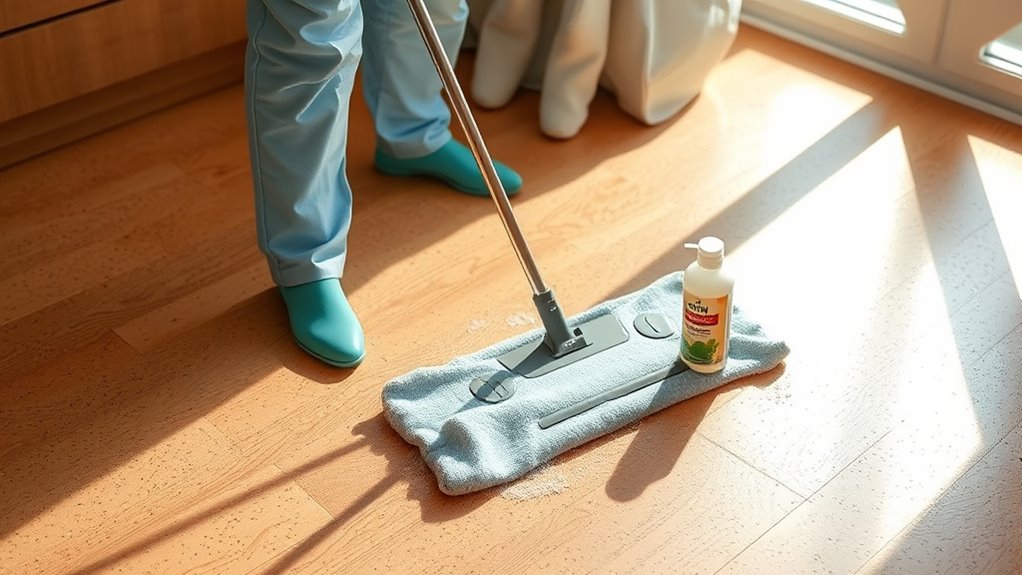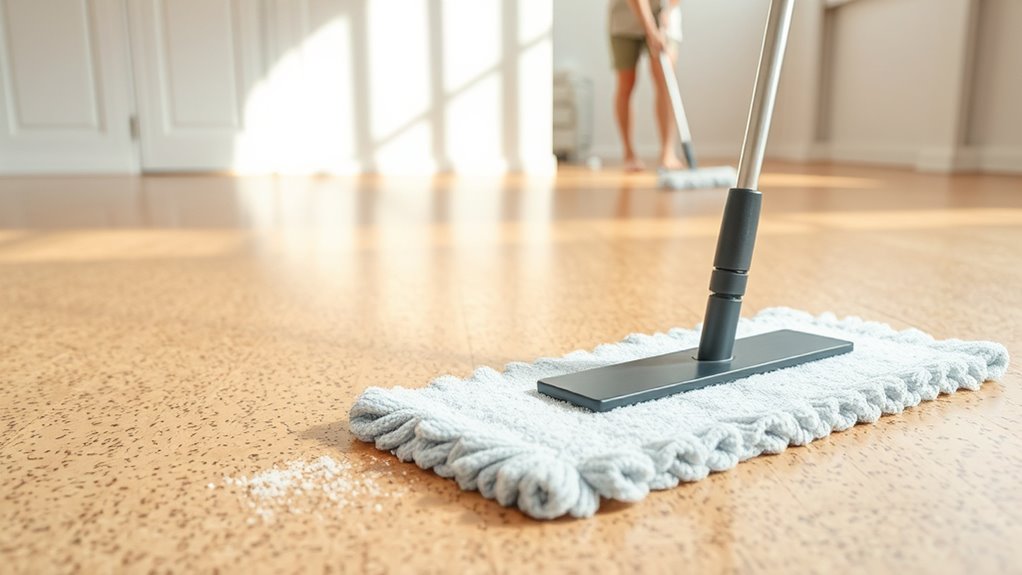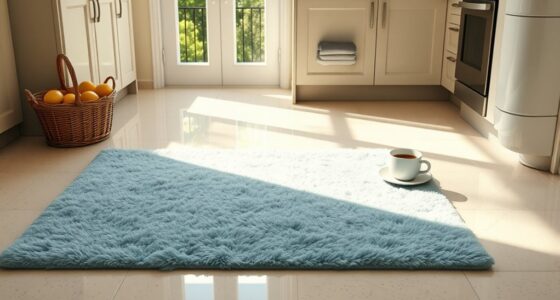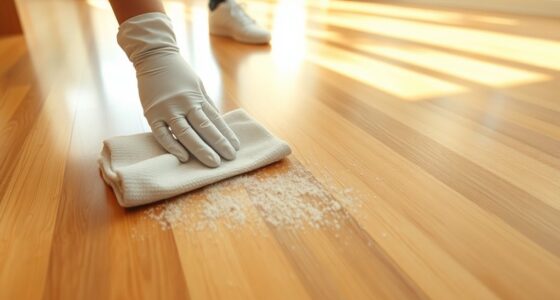To keep dust under control on cork floors and create an allergy-safe space, vacuum 2-3 times weekly with a HEPA filter and a soft brush setting, focusing on high-traffic areas. Use a damp microfiber cloth with a mild, pH-neutral cleaner to mop and dry immediately. Place doormats at entry points and encourage shoe removal to reduce dirt. Continue exploring for more tips to maintain a cleaner, healthier environment for you.
Key Takeaways
- Vacuum cork floors 2-3 times weekly with a HEPA-filter vacuum to remove airborne dust and allergens effectively.
- Use a damp microfiber cloth with pH-neutral cleaner to gently clean, avoiding excess moisture that can trap dust.
- Place doormats at entryways and encourage outdoor shoe removal to minimize dirt and dust tracked inside.
- Dust furniture and baseboards regularly with microfiber cloth to prevent dust settling on the floor.
- Maintain good indoor air quality with proper filtration and ventilation to reduce airborne dust and allergens.

Dust can quickly accumulate on cork floors, leading to a dull appearance and potential health issues for those with allergies. To keep your floors looking fresh and to reduce allergens, establishing a regular cleaning routine is essential. One of the most effective ways to manage dust buildup is by paying attention to vacuum frequency. You should aim to vacuum your cork floors at least two to three times a week, especially in high-traffic areas. This helps prevent dust, pet hair, and debris from settling deeply into the surface and the tiny pores of cork, which can trap allergens over time. When vacuuming, use a machine with a soft brush or a setting designed for hard floors. This gentle approach prevents scratching or damaging the cork while ensuring thorough dust removal. According to the Value of Home Security Systems, maintaining a clean environment can also contribute to overall safety and well-being.
Choosing the right cleaning products is equally important. Many commercial cleaners contain harsh chemicals that can deteriorate cork over time, so opt for mild, pH-neutral cleaners specifically formulated for natural floors or cork surfaces. Avoid overly wet mops, which can cause the cork to swell or warp; instead, use a damp mop with a minimal amount of cleaning solution. After mopping, dry the surface immediately with a clean, dry microfiber cloth to prevent moisture from seeping into the material.
In addition to regular vacuuming and careful cleaning product selection, adopting a proactive approach can further enhance dust control. Place doormats at entry points to trap dirt and dust before it reaches your floors. Encourage family members and visitors to remove shoes, especially if they’ve been outdoors, as this reduces the amount of dirt tracked inside. Regularly dust furniture and baseboards with a microfiber cloth to prevent dust from becoming airborne and settling onto the cork floor. Using a vacuum with HEPA filters can also improve air quality by capturing tiny particles that standard filters might miss.
Frequently Asked Questions
How Often Should I Deep Clean My Cork Floors?
You should deep clean your cork floors every 3 to 6 months, depending on foot traffic and dust accumulation. Regular vacuum maintenance is essential to keep dust and allergens at bay, especially if you want an allergy-safe routine. Increase cleaning frequency if you notice more dust or dirt, and always use a gentle, damp mop to avoid damaging the cork surface. Consistent deep cleaning helps maintain your floors’ beauty and allergy safety.
Are There Specific Vacuums Best for Cork Flooring?
You’ll want a vacuum with a strong filtration system to protect your cork floors. Brands like Miele or Dyson are excellent choices, featuring HEPA filters that trap tiny dust particles and allergens. Their powerful suction ensures thorough cleaning without scratching the surface. Choosing the right vacuum isn’t just about convenience—it’s about safeguarding your allergy-safe routine, keeping your cork floors pristine, and breathing easier every day.
Can I Use Steam Cleaners on Cork Floors Safely?
You can use steam cleaners on cork floors, but you need to be cautious. Make sure the steam cleaner has adjustable settings to control moisture, as excessive moisture can cause damage. Keep the steam at a safe distance and avoid prolonged exposure, since moisture damage can warp or swell the cork. Always test a small area first to confirm your floor tolerates steam cleaning without harm.
What Natural Remedies Help Reduce Dust Buildup?
Think of your home as a garden that needs tending. You can use air purifiers to capture airborne dust, much like a gardener prunes away excess growth. Natural dust repellents, like baking soda or vinegar solutions, act as barriers, preventing dust from settling. Regular sweeping and wiping with these remedies help keep your cork floors clean, creating a healthier environment where dust doesn’t take root, much like weeds kept at bay.
How Do Humidity Levels Affect Dust Accumulation?
Higher humidity levels can increase dust levels by making dust particles stick to surfaces more easily. Conversely, low humidity can cause dust to become airborne more frequently, spreading throughout your space. Maintaining ideal humidity, around 40-50%, helps balance dust effects, reducing buildup and airborne dust. You’ll notice less dust settling on your cork floors and fewer allergy triggers when you manage humidity effectively.
Conclusion
To keep your cork floors dust-free, stay consistent with regular sweeping, regularly damp-mopping, and using a gentle vacuum. Keep your environment clean, minimize dust buildup, and prevent allergens from settling. By staying proactive with your dust control routine, you protect your allergies, preserve your floors, and create a healthier home. Make cleanliness a habit, embrace simplicity, and enjoy the comfort of a dust-free, allergy-safe space. Your cork floors and your lungs will thank you.









